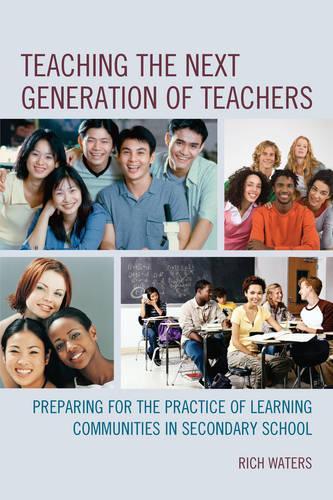
Teaching the Next Generation of Teachers: Preparing for the Practice of Learning Communities in Secondary School
(Hardback)
Available Formats
Publishing Details
Teaching the Next Generation of Teachers: Preparing for the Practice of Learning Communities in Secondary School
By (Author) Rich Waters
Bloomsbury Publishing PLC
Rowman & Littlefield Publishers
30th September 2016
United States
Classifications
Professional and Scholarly
Non Fiction
Teaching skills and techniques
371.1
Physical Properties
Hardback
174
Width 158mm, Height 239mm, Spine 18mm
390g
Description
Teaching the Next Generation of Teachers looks to serve the many teachers who teach or sponsor classes, clubs, or conferences for secondary school students who aspire to become teachers. Based on the authors research with students in the Tomorrows Teachers program, the books development is rich with the voices of students and their reflections on how teachers sometimes inspired them to teach and sometimes impelled them to think of new ways to teach. Their personal stories as learners will validate all students experiences as it both invites and inspires aspiring teachers in secondary schools to fulfill their dreams by becoming teachers. Guided by the learning community concept, it presents research and practical activities that will assist teachers and their students in re-imagining and re-inventing what teachers and schools do. It does this as it presents important research on how professional learning communities have the most positive effects on student learning while also empowering teachers to greater job satisfaction. Most importantly, this book will serves as a practical, how-to guide so secondary school students can begin to experience working in a professional learning community as they strive to improve the schools they are in right now. In doing this, the book adheres to the idea that student leadership now is the best preparation for teacher leadership later. It will help aspiring teachers move away from the many stale traditions in schooling as they re-conceive of the profession in ways that will make it more personally satisfying while acknowledging that the work of teachers in the 21st century must necessarily be different from what we have now, legacy practices of standardization left over from the industrial age.
Reviews
As school districts across the nation experience a teacher shortage crisis, the development and training of new teachers can no longer be considered the sole responsibility of the university. Secondary schools have begun to embrace the cultivation of future teachers through targeted programs and curricula. In this work, Dr. Waters encourages students to begin to think differently and to ask questions about what it means to be a teacher. This is not a methods book. Students are asked to create a new mindset about teaching and learning. Collaboration and reflection (especially in Professional Learning Communities) are essential skills. Teaching the Next Generation of Teachers is a must read for any secondary school introduction to teaching program. Teaching as one was taught can no longer rule the day. It is incumbent up all of us to help produce teachers with the mindset and skills to work in the 21st century. -- Ed Yergalonis, former high school principal and district superintendent, Rahway Public Schools, New Jersey
I enjoyed the book. In particular, I was surprised at the insight the author had into teenagers. He knew that we are good at 'school' and not necessarily at learning. He sees that we have figured out the system. -- Michael Akakpo, high school senior
It was different to see that an adult was able to perceive us accurately. This would be a valuable book for new and veteran teachers for better insight into their students. -- Rachel Vazquez, high school junior
Author Bio
Rich Waters is a career high school teacher and Ph.D. whose interests in school reform and teacher education led him to assist in the creation and co-coordination of a professional development school and later to become a founding member of the National Association of Professional Development Schools. His decades of work and recent research in a high school helped him to see the need to reach out to secondary school students to help them reconsider the very concepts of teaching and schooling in the 21st century.
